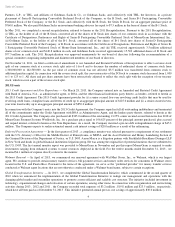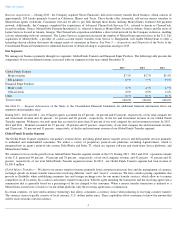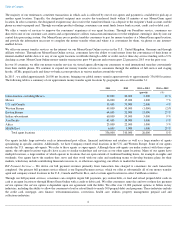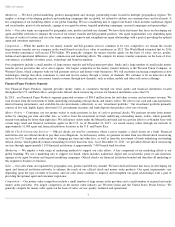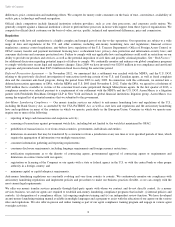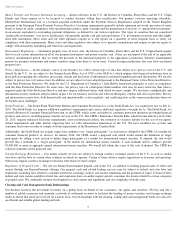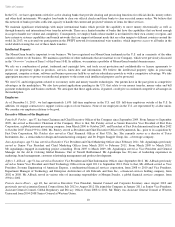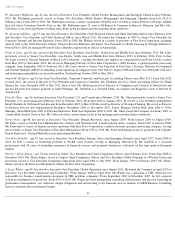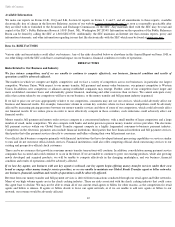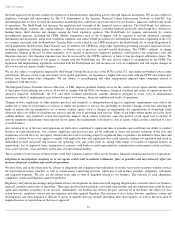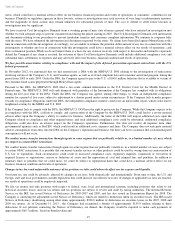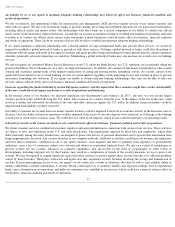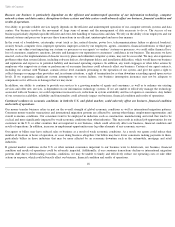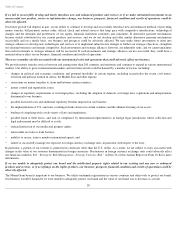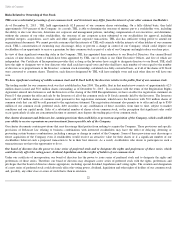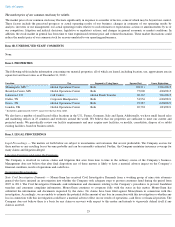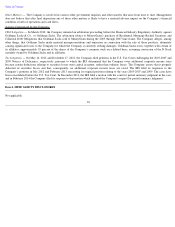MoneyGram 2013 Annual Report Download - page 16
Download and view the complete annual report
Please find page 16 of the 2013 MoneyGram annual report below. You can navigate through the pages in the report by either clicking on the pages listed below, or by using the keyword search tool below to find specific information within the annual report.
Table of Contents
the trend appears to be greater scrutiny by regulators of potential money laundering activity through financial institutions. We are also subject to
regulatory oversight and enforcement by The U.S. Department of the Treasury Financial Crimes Enforcement Network, or FinCEN. Any
determination that we have violated the anti-money-
laundering laws could have an adverse effect on our business, financial condition and results
of operations. The Dodd-Frank Act increases the regulation and oversight of the financial services industry. The Dodd-
Frank Act addresses,
among other things, systemic risk, capital adequacy, deposit insurance assessments, consumer financial protection, interchange fees, derivatives,
lending limits, thrift charters and changes among the bank regulatory agencies. The Dodd-
Frank Act requires enforcement by various
governmental agencies, including the CFPB. Money transmitters such as the Company will be required to provide additional consumer
information and disclosures, adopt error resolution standards, and adjust refund procedures for international transactions originating in the U.S.
in a manner consistent with the Remittance Transfer Rule (a rule issued by the CFPB pursuant to the Dodd-
Frank Act to amend Regulation E,
which implements the Electronic Fund Transfer Act). In addition, the CFPB may adopt other regulations governing consumer financial services,
including regulations defining unfair, deceptive, or abusive acts or practices, and new model disclosures. The CFPB’
s authority to change
regulations adopted in the past by other regulators, or to rescind or ignore past regulatory guidance, could increase our compliance costs and
litigation exposure. Our litigation exposure may also be increased by the CFPB’s authority to limit or ban pre-
dispute arbitration clauses. We
may also be liable for failure of our agents to comply with the Dodd-
Frank Act. We may also be subject to examination by the CFPB. The
legislation and implementing regulations associated with the Dodd-
Frank Act will increase our costs of compliance and will require changes in
the way we and our agents conduct business.
We are also subject to regulations imposed by the Foreign Corrupt Practices Act, or the FCPA, in the U.S. and similar anti-
bribery laws in other
jurisdictions. Because of the scope and nature of our global operations, we experience a higher risk associated with the FCPA and similar anti
-
bribery laws than many other companies. We are subject to recordkeeping and other requirements imposed upon companies related to
compliance with these laws.
The European Union’
s Payment Services Directive, or PSD, imposes potential liability on us for the conduct of our agents and the commission
of third party fraud utilizing our services. If we fail to comply with the PSD, our business, financial condition and results of operations may be
adversely impacted. Additionally, the U.S. and other countries periodically consider initiatives designed to lower costs of international
remittances which, if implemented, may adversely impact our business, financial condition and results of operations.
Changes in laws, regulations or other industry practices and standards, or interpretations of legal or regulatory requirements, may reduce the
market for or value of our products or services or render our products or services less profitable or obsolete. Changes in the laws affecting the
kinds of entities that are permitted to act as money transfer agents (such as changes in requirements for capitalization or ownership) could
adversely affect our ability to distribute our services and the cost of providing such services. Many of our high volume agents are in the check
cashing industry. Any regulatory action that negatively impacts check cashers could also cause this portion of our agent base to decline. If
onerous regulatory requirements were imposed on our agents, the requirements could lead to a loss of agents, which, in turn, could lead to a loss
of retail business.
Any violation by us of the laws and regulations set forth above could lead to significant fines or penalties and could limit our ability to conduct
business in some jurisdictions. Our systems, employees and processes may not be sufficient to detect and prevent violations of the laws and
regulations set forth above by our agents, which could also lead to us being subject to significant fines or penalties. In addition to these fines and
penalties, a failure by us or our agents to comply with applicable laws and regulations also could seriously damage our reputation and result in
diminished revenue and profit and increase our operating costs and could result in, among other things, revocation of required licenses or
registrations, loss of approved status, termination of contracts with banks or retail representatives, administrative enforcement actions and fines,
class action lawsuits, cease and desist orders and civil and criminal liability.
The occurrence of one or more of these events could have a material adverse effect on our business, financial condition and results of operations.
Litigation or investigations involving us or our agents could result in material settlements, fines or penalties and may adversely affect our
business, financial condition and results of operations.
We have been, and in the future may be, subject to allegations and complaints that individuals or entities have used our money transfer services
for fraud-
induced money transfers, as well as certain money laundering activities, which may result in fines, penalties, judgments, settlements
and litigation expenses. We also are the subject from time to time of litigation related to our business. The outcome of such allegations,
complaints, claims and litigation cannot be predicted.
Regulatory and judicial proceedings and potential adverse developments in connection with ongoing litigation may adversely affect our business,
financial condition and results of operations. There may also be adverse publicity associated with lawsuits and investigations that could decrease
agent and consumer acceptance of our services. Additionally, our business has been in the past, and may be in the future, the subject of class
action lawsuits, regulatory actions and investigations and other general litigation. The outcome of class action lawsuits, regulatory actions and
investigations and other litigation is difficult to assess or quantify but may include substantial fines and expenses, as well as the revocation of
required licenses or registrations or the loss of approved
14


